 |
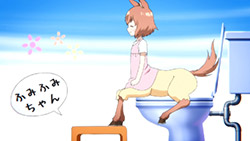 |
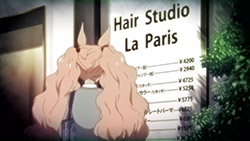 |
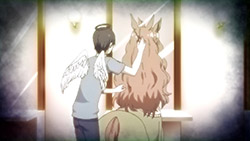 |
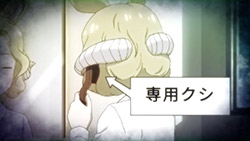 |
 |
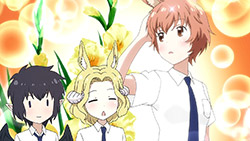 |
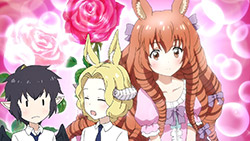 |
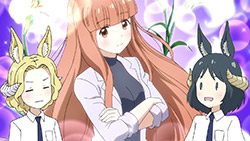 |
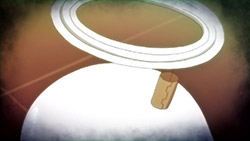 |
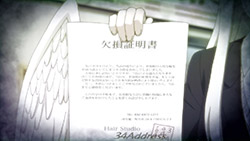 |
 |
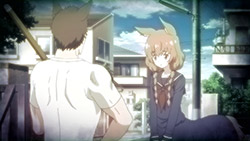 |
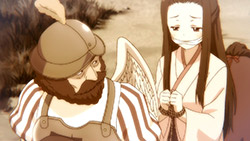 |
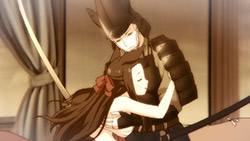 |
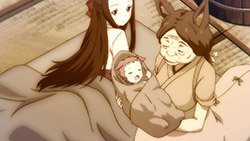 |
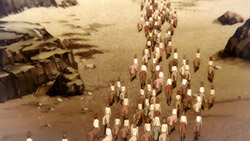 |
 |
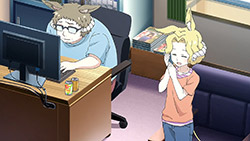 |
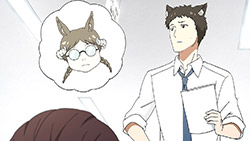 |
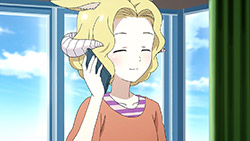 |
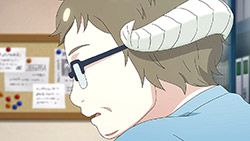 |
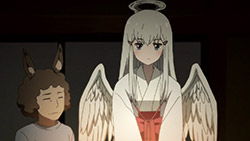 |
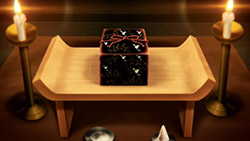 |
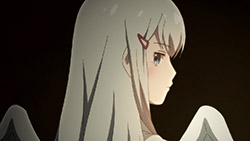 |
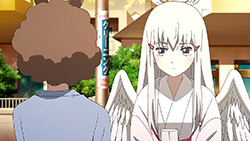 |
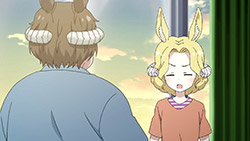 |
 |
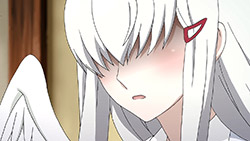 |
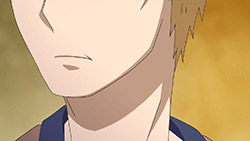 |
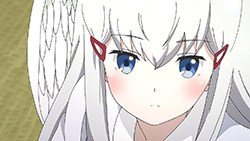 |
 |
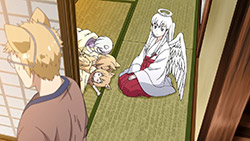 |
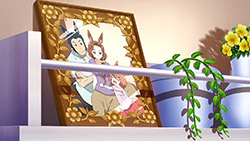 |
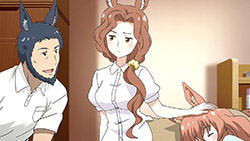 |
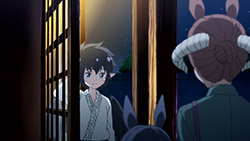 |
「先祖や歴史のことを遡れるのは, むしろ幸福? それとも不幸? / 本当に好きなことを仕事にすることは果たして幸せなのかな?」 (Senzo ya Rekishi no Koto o Sakanoboreru no wa, Mushiro Koufuku? Soretomo Fukou? / Hontou ni Suki na Koto o Shigoto ni Suru Koto wa Hatashite Shiawase na no ka na?)
“Is Being Able to Retrace One`s Past and Ancestors a Reason to Be Happy or Unhappy? / Does Getting a Job Doing What You Love Really Bring Happiness?”
It doesn’t celebrate Father’s Day per se, but it commemorates the good “Father of the Year” effort that the dad’s of Centaur no Nayami put into supporting their kids. Seeing the differences between how most of the main cast dealt with their fathers gave depth to how their home lives fare. We’ve seen plenty of Himeno’s dad throughout the series as a supportive yet childish figure akin to his daughter, and that comes out in full force with his monster dumps taking up too much time in the day.
For the other fathers, however, their work life is a bit spotty. Kyouko works as her dad’s secretary and intends on lighting a fire under his ass enough so to get his writing finished on-time. The dynamic threw me off at first, but it’s understandable that Kyouko is trying to encourage her father to keep on-top of work he can easily turn in on time, but would put off out of convenience. I’m unsure of Nozomi and Sassassul’s parents in the episode, but their POV does flesh out their motivations and uncertainty over their goals.
The harshest daughter-father relationship in the episode was without a doubt Manami and her painter dad. As she scams skeptical people into having her ward off “haunted” possessions, he’s suffering from writer’s block and puts off his work regularly to move onto anything else that isn’t painting. He doesn’t devote 100% to parenting or painting, and Manami puts him on blast with a speech on how half-assed he is as a father and as a painter. Even I felt that burn. On one end, I was thinking “Geez, that’s a little rough, don’cha think?” as they kept jumping back to the father biting his lip as he soaks in her daughter’s smackdown, unsure of whether to reach for the dinner he’s making or the bottle of aloe vera.
On the other end, it’s the same sentiment with Kyouko where she is trying to push her father into taking his work seriously. The main difference is that there are way more mouths to feed. Manami’s dad has a larger responsibility to improve as an artist and take his work seriously with the amount of children and bills in his family. Sue has an illness, so there’s a sense of urgency in being financially stable enough to help cover the costs of keeping her healthy. On top of that, with Manami’s scam work bringing in what should be her dad’s wages, it’s also easy to understand why Manami of all people would be upset that her dad is too lax about his writer’s block and only being kinda sorta there for his kids.
The world-building was well done during the first segment on the role hair plays in society. It built on the world’s justice system with how important it is for an angel to keep their halo, and must have certification that lets authorities know that if their halo is gone, it was an accident and wasn’t an act of self-hatred. Himeno’s hair took center stage as her desire to change up her hair is undercut by the difficulty of changing up her hairstyle, the complication of getting a haircut from a barber of another race that has a hard time working with centaur hair, and all the questions that are brought up about her hair color. The latter of which explained why a teacher was sent to prison for constantly badgering her with accusations of dying her hair, and led Himeno to tell her classmates about how far back her ancestry goes to have gotten reddish hair. It was neat how the show was able to go back and forth between discussing Himeno’s hair and the historical tension between centaurs and angels, where centaurs were enslaved on a massive scale until war broke out. It also placed an ethnicity on some of the races with the predominantly European look of the angels and the Japanese clothing and gear that centaurs wear. I’m curious about how the anime will continue to build on the world’s history, and how everyone lives with each other given their complicated history and extreme laws.
As a side note, I wonder what the author or writers’ understanding of American politics is? Himeno’s dad is watching the news to find that America’s election had the Democratic Communist candidate Imecocca the victory, but I’m not sure if that’s a mistranslation, it’s a party that would exist in that world, or if they’re watching news that would refer to anyone as communist? As an American, it was interesting to learn that the Liberal Democratic Party was their right-wing party because in the sphere of our country’s politics, the words “liberal” and “democratic” are to the left. I doubt the word “communist” changes much in Japanese context, but it’s an odd choice to have American’s elect someone who would self-identify as communist. I mean, we have infotainment that name-call politicians as communists and elected one of the strangest candidates last year, but politicians here that would self-identify as a communist are objectively regulated to a third party, and they’re certainly not as mainstream as the Green or Libertarian parties. Again, apologies for the politics, but it is tricky to approach the series without discussing how it handles its own politics, especially because the story stresses that its themes don’t exist in a vacuum, and are a fantasy version of what occurs in reality to this day.

No! Nozomi do not grow your hair out! I love your short tomboy bob. You’re so beautiful with it!
😀 😀 😀 😀 😀 “Hi! Yeah that guy got arrested for mistaking my red hair for being dyed and was beaten by the police. Horribly. Mangled! What ev’s! The sun’s out today! How was your morning??” 😀 😀 😀 😀 😀
Himeno is just a sweet little child. Siigh. *shrug*
The second story really didn’t grab me as much as the first one. Dunno why. It just felt kind of like a nothing plot to me.
It’d be devastating to see Nozomi grow her hair so long. It was funny how everyone mentioned it as a “by the way” factoid. Like “Oh no worries, I’m cool. The teacher was promptly beaten and jailed for his indiscretion!”
The second story was good for giving us insight on Mitama’s personal life and some of Kyouko’s relationship with her dad, but it didn’t seem as powerful or strong as the segment before on the history behind Himeno’s hair.
I’m going to call the anthropic principle in on this. So basically it’s no wonder that they have a virtually Maoist political system where “Liberal Democratic” parties are as right wing as you can get without (presumably) being thrown in prison because that’s the only sort of system that, in the writer’s view, would allow for a world like the one depicted here to exist.
As we saw from what happened in medieval times, there was a lot of tension between the different human types, and things probably were heading for one type eventually wiping out all the others. But maybe there was some sort of ultra-left wing revolution at some point that allowed all the types to co-exist in a peaceful and generally harmonious way, but only because the threat of prison or re-education camp hangs over everyone for a wrong word or action.
I can see that being the case where somewhere along the way, generations of racial blood feuds culminated in needing an extreme communist revolution to quell the racial violence, and get everyone on board with burying the hatchet by enacting strict laws that make sure they don’t have to bring any of their wars up again.
When you look at how “everyone is equal” in the show, that flows very nicely in with Communism. I would assume that all political parties would be advocating some form of Communism or risk being treated as a terrorist group. Just look at how they are using tax dollars to research autonomy mechs for Mer-people.
In a world like this, it would make sense that every country’s political parties have incorporated variations of Communism to adhere to the idea that all species must be equal or else. Where it’d be career suicide to not have shades of Communism in your party’s platform.
The thing is, that most multicultural Communist countries tended to fall back on the dominant ethnic group dominating the others (e.g. Russians in the USSR or Han Chinese in China).
Ironically enough, it is the ideology now associated with genocide which originally in theory was the most egalitarian (though still unequivocally evil): Fascism. While the NAZIs (National Socialist German Workers Party) focused on Jews and other such groups, and the Soviets focused on class enemies like the Kulaks, the more philosophical and theoretical Fascism posited that the state ought to arrange social and economic structures for mutual benefit of all groups therein (i.e. corporatism)… theoretical at least.
As such, the anime, far more than the manga ever did, almost comes across as 萌え fascist propaganda…
https://randomc.net/image/Centaur%20no%20Nayami/Centaur%20no%20Nayami%20-%2006%20-%20Large%2006.jpg
https://randomc.net/image/Centaur%20no%20Nayami/Centaur%20no%20Nayami%20-%2006%20-%20Large%2009.jpg
I could dig it, lol.
As for the politics, not too surprising given some countries / parties calling themselves “Liberal”, “Democratic”, etc. but are anything but (ie. North Korea, China, etc.) And yeah, if someone in the US actually called themselves a “Communist” (even if they followed the actual ideology and not pervert it like virtually all “Communist” countries do / have done), they would be demonized to no end unless they changed the name. I mean, fascist / Nazi / hate ideology is trying to call itself “Alt-Right” and now suddenly it sounds like they have some sort of legitimacy even though the practices are the same.
Remember, Nazis are national socialists. They have far more in common with communists than they do western enlightenment ideals. Personal property isn’t something either of them honor. Communism can’t make people give up their own property unless at the point of a gun. When you have to do that, then the system is corrupt to begin with. It is inherently authoritarian. Remember, both ideologies are awful and they simply don’t work.
The world of Centaur no Nayami is a little scary to me. But I’m big on personal liberty.
The Nazis’s were Fascists and one of the first thing Hitler did when he got control of the party was to kill or drive off all the actual socialists in it. There is a reason the “alt-right” is the “alt-right” instead of the “alt-left”.
Both were collectivist ideologies based on Hegelian Dialectic.
In reply to @Magewolf:
The Hitlerites were actually seen as more moderate as they didn’t want the industrial appropriation and replacement of the military as the early NAZI propaganda and the Strasserites (known as “beefsteaks” – brown on the outside, red on the inside) were.
Interestingly enough, the appellation “Night of the Long Knives” was never used in Germany because the “Long Knives” was an illusion to Jutes/Saxons under Hengist and Horsa who, during a celebration, slaughtered Romano-Britons with their Saex (the proverbial long knives that free Saxon men of right could carry) “red wedding” style.
Just for clarity: Tama-chan’s work comes across as a scam because she doesn’t believe in things like curses or spirits or gods. Having had to grow up faster than several of her peers, she’s developed a very levelheaded, practical, and cynical outlook of the world. However, she is in fact a miko: her family lives at the shrine, and Tama works as a miko for ceremonies and events and such. So when a somewhat paranoid woman called up the shrine insisting that she was suffering from a curse, Tama had a choice between saying “don’t be ridiculous, there’s no such thing as curses, please get a grip” or “of course, we’ll send someone down right away. If you could prepare a donation to the shrine to cover the taxi fair and our time we would be most grateful.” She, of course, chose the polite option that earned some money for her family, and helped maintain the shrine’s reputation in the community.
I think the misunderstanding comes from Kyoko’s father suggesting that she was in a scam… but in the sense that she wasn’t a true miko.
I also think it’s an issue of a dissonance in values. Not everyone is used to the concept that it’s not strange for Japanese temples to earn their own income by selling charms, providing services, encouraging donations, etc.
This show just got very interesting. As it stands right now, it whitewashes Japanese involvement in slavery. If that remains unchanged, if it ends up portraying Japan purely as a victim not just of slavery but also of sex slavery (i.e., comfort women), it will be distasteful not only because of the actual events it will have misrepresented but also because of Japan’s use of slavery during WWII and its long reluctance to acknowledge it.
Hime’s story about her enslaved ancestor clearly refers to the actual 16th century Portuguese slave trade of Japanese (southern barbarians = Nanban = Portuguese and most other Europeans). That trade included sex slavery. But the anime minimizes the involvement of the Japanese in its version of this slave trade by having its barbarians capture the slaves directly rather than purchase them from Japanese warlords (sales that also included Koreans captured by the Japanese during their invasion of Korea in the 1590s).
It’s possible that the anime will revisit this event with a more balanced account. One reason to think that is because ep1 at 16:50 links centaur slavery to the current laws, and the story seems to be working its way to saying something about those laws. That passage also says that centaur slavery was something only other countries did, but I suspect we can’t trust that. Hime’s story about the enslavement of her ancestor is quite fantastic, so I suspect it’s mythologized, and we’ll learn the real story later.
Hime’s account of it could be the product of what is culturally accepted as the historical truth, but it wouldn’t be surprising if it was sanitized or distorted for the nation’s benefit. We’d have to see how the series portrays China to get a better feel for if Japan’s involvement with slavery in the series is considered to be the state’s version of the history or part of the author’s personal ideology.
Probably not too much of a stretch to imagine they managed to mistranslate Democratic Socialist into Democratic Communist.
I had a feeling that was a mistranslation!
Personally, I’m not sure the name of the “Democratic Communist” party of America implies any deep political meaning, but a funny way to showcase that this is an alternate universe (like how evolution was explained to have followed a different path).
I mean, few things say “alternate world” as loudly as “America has a Communist President!” XD
As an European myself, I actually understand the Japanese position.
In America, the word “liberal” may be associated with the concept of “Social Liberalism”, which includes social justice and the role of the state in issues such as unemployment, health care, education, and civil rights. However, in other countries (including, I suspect, Japan), “liberal” is associated mainly with “Economic Liberalism”, and thus the concepts of free market, private property and capitalism.
Ultimately, however, I believe that the labels that politicians choose for their institutions don’t say much about their real politics. I mean, if you found Japan’s Liberal Democratic label strange, wait until you hear that the European People’s Party is the largest alliance of conservative parties in the European Union.
That’s how it’s understood in America.
It also refers to “classical liberalism” in other Western countries such as America.
Correct me if I’m wrong, but it was my impression that when someone uses the “liberal” word in America without any other context (“That person is a liberal.”), it’s usually in reference to social liberalism, thus Choya’s comments about the word “liberal” being “to the left”. I’m not saying Americans don’t use that term for economic liberalism and classical liberalism too, mind you.
In my country it would be the other way round. For example, if someone says “That person is a liberal”, the first thing we’d think is that said person is a supporter of capitalism and free market. If not, we’d think they may be talking about classical liberalism. To think of social liberalism, we’d need more context first.
In America, “liberal” is just a synonym for someone who is politically left-of-center. “Economic liberal” just means someone with a left-of-center view on economic issues.
“Economic Liberals” are not left leaning. They classify on the right side.
https://randomc.net/image/Centaur%20no%20Nayami/Centaur%20no%20Nayami%20-%2006%20-%2027.jpg
Harshest daughters in anime this season.
https://randomc.net/image/Centaur%20no%20Nayami/Centaur%20no%20Nayami%20-%2006%20-%2033.jpg
Extremely harsh! Mind telling Manami that in some households children are “only” an eighteen-year commitment? Or that the time-honored practice of the oldest child forever taking care of elderly parents without compensation, or even the right of inheritance, is still practiced around the world?
I thought Kyouko was rough on her dad, and then Manami topped it by demolishing her dad’s efforts in raising his kids and the lack of passion in his work.
[Expletive Deleted], being arrested and re-education for “denying one’s race” for nothing more than wanting a different hairstyle?
[Even More Expletives Deleted], that can be an understandable misunderstanding. Even in actual modern day Japan dark brown and even red hair can naturally exist, even without documentable evidence.
On a side note…
Show Spoiler ▼
The anime producers are Bernie-bros?
Between a Communist President and the fanatical crushing of racial/kin thoughtcrime expression, this show would be in the same vein (though not to the same degree… yet) of a “cute Khmer Rouge girls doing cute Khmer Rouge things” anime set in 1977 Kampuchea…
https://randomc.net/image/Centaur%20no%20Nayami/Centaur%20no%20Nayami%20-%2006%20-%20Large%2016.jpg
What Hime is implying is that at some point in the past – her ancestors were raped and impregnated. The gene was so strong it is still active in Hime’s time…
Hime’s story implies this, but Hime doesn’t appear to get it. When Nozomi asks whether Hime’s hair color is because she’s “half-Japanese”, Hime answers no and tells her story as if the event and the hair color are merely coincidental, after which Nozomi replies that it is because she’s half-Japanese.
There seems to be a misunderstanding here, but the “work” as a painter is NOT the “work” that feeds mouths. Manami’s father has another job that goes toward paying the bills. He doesn’t earn enough (or even anything??) as a painter.
Manami is criticizing her father for not putting more effort into his paintings, even if it means neglecting his job&family to do so. Which does he want to be? A good father (who works at normal job & spends his spare time taking care of his family) or a serious artist? It’s not like he has the talent to achieve both, so he should give up on one or the other instead of wasting time and effort half-assing it.